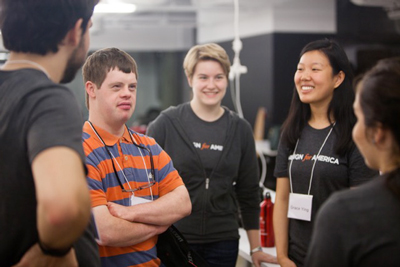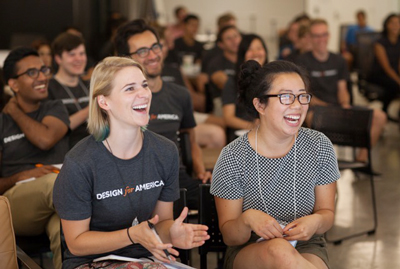Student Design Leaders Meet to Tackle Down Syndrome Issues
Nearly 100 Design for America students from around the country gathered for the annual leadership studio at Northwestern
After receiving troubling results from the genetic tests administered during pregnancy’s first trimester, expectant parents are often sent home empty handed. For a mother interviewed during this year’s annual Design for America (DFA) Leadership Studio, this scenario rang painfully true. Doctors broke the news that her child had Down syndrome. Within seconds, her dreams of a healthy child shattered, and her visions for the future became steeped in the unknown.
 “Unfortunately, most hospitals are currently unequipped to help parents through this grief and transition,” said Tyler Matheson, a sophomore from the University of Southern California who attended the studio. “So they just go home and feel helpless.”
“Unfortunately, most hospitals are currently unequipped to help parents through this grief and transition,” said Tyler Matheson, a sophomore from the University of Southern California who attended the studio. “So they just go home and feel helpless.”
Matheson was one of nearly 100 students who gathered at Northwestern from August 6 to 10 to develop solutions for people touched by Down syndrome. The sixth annual DFA Leadership Studio brought together students from 28 universities across the country to learn about design, social innovation, and creative leadership.
During the four-day event, students listened to a keynote speech by Bridget Brown, a woman with Down syndrome and vice president of the National Association for Down Syndrome. Then they participated in an empathy workshop and interviewed those touched by the genetic disorder, including parents and caretakers.
A grassroots, student-led network, DFA began at Northwestern six years ago and spread across the nation to several universities, including Stanford, Massachusetts Institute of Technology, Cornell, and Yale. More than 1,000 students are now involved with the organization, where they assess social challenges using a human-centered design process and work collaboratively to implement solutions.
“We wanted students to emphasize inclusivity and remove the taboos associated with Down syndrome,” said Sami Nerenberg, associate director of DFA. “We instructed them to focus on people’s abilities rather than disabilities because everyone has something to offer the community.”

Teams presented their solutions on Sunday at a pitch expo attended by business professionals and DFA staff and alumni. Matheson and his group addressed the turmoil surrounding a child’s Down syndrome diagnosis. The team introduced a series of care packages delivered to families coping with the diagnosis. The packages bring together emotional and practical resources, such as informational pamphlets, to help empower the parents with knowledge.
Inspired by keynote speaker Brown, another team pitched a series of dolls modeled after notable people with Down syndrome. “We wanted to bring attention to the commonness of Down syndrome,” said Michelle Baverman, a student from the University of Cincinnati who worked on the project. “Children playing with these dolls will see that there are many people with Down syndrome who accomplish great things.”“Parents in this situation have many questions, including what schools their child can attend,” Matheson said. “Having the answers to these questions can help parents change their mindsets faster and start setting goals right away.”
After a fast-paced four days, Northwestern Engineering Dean Julio M. Ottino closed the event with remarks about DFA, creativity, and the future.
“When forming Design for America, we asked: ‘What would people do if they could do whatever they wanted?’” Ottino said. “We wanted to allow people to have the freedom to choose which problems to tackle. If you want a glimpse of what is to come, then look at what problems people choose to focus on now. Those are the things that will be important in the future.”
Schools that participated in the Leadership Studio were:
1. Northwestern
2. Cornell
3. Stanford
4. Barnard-Columbia
5. University of Oregon
6. UCLA
7. RISD-Brown
8. Vanderbilt
9. Case Western Reserve
10. University of Illinois, Urbana-Champaign
11. Virginia Tech
12. Yale
13. University of California, Berkeley
14. Baltimore
15. Rice
16. Duke
17. MIT
18. Michigan State
19. Rensselaer Polytechnic Institute
20. Washington University
21. New York University
22. University of Southern California
23. University of California, San Diego
24. University of Alabama
25. Notre Dame
26. University of Texas, Austin
27. University of North Carolina, Chapel Hill
28. University of Cincinnati